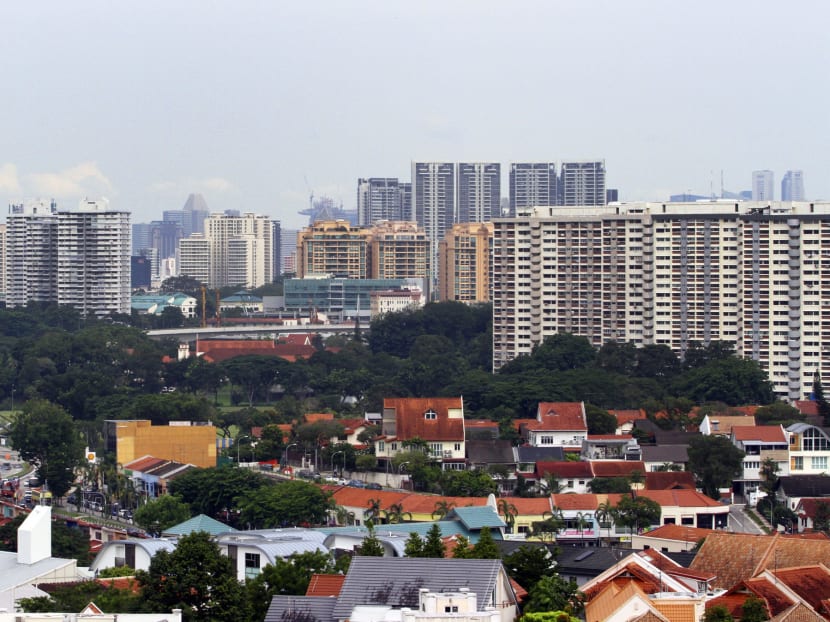Worries about private homes oversupply unfounded for now: Report
SINGAPORE – It is “far too early” to worry about a potential oversupply of private homes due to a surge in en bloc deals, a research house said in a report on Monday (Dec 18).
SINGAPORE – It is “far too early” to worry about a potential oversupply of private homes due to a surge in en bloc deals, a research house said in a report on Monday (Dec 18).
While this could be a valid concern if the trend continues, the report by Maybank Kim Eng analyst Derrick Heng pointed out that the redeveloped properties from the collective sales would not come onstream until 2020 to 2021.
Even after accounting for the completion of these projects in three to four years, the average net supply is “still not excessive”, at slightly above 11,000 units per year, Mr Heng wrote. This figure is significantly lower than the 19,500 units that were added annually between 2014 and last year, the report noted. It is also below the five-year average absorption rate of 13,200 units.
“As long as home buying sentiment is maintained, we believe fresh inventory from the Government Land Sales (GLS) and en bloc deals done can comfortably be absorbed,” the report said. Any delay or dispute in the en bloc deals could also push back the availability of new inventory for sale, it noted. “This should keep the supply of unsold units in the market in check,” the report reiterated.
Last month, the Monetary Authority of Singapore (MAS) said in its financial stability review that the supply of private housing will increase significantly over the next few years, with units up for sale more than doubling in the same period.
Warning that recent developments – including the rise in prices and volume of transactions, the en bloc fever and high interest from developers in government land sales – could pose risks to the property market, MAS called on developers, potential buyers and banks to “proceed cautiously”.
Subsequently, the Government announced it will keep the supply of development land for private housing steady for the first half of next year. The Ministry of National Development noted that there is a “large potential supply of around 20,000 units” from awarded en bloc sales and GLS sites that have not yet been granted planning approval, on top of about 18,000 unsold units that already have planning approval.
There are also more than 30,000 existing private housing units that remain vacant, the ministry said. Analysts had said that maintaining a steady supply was a prudent move by the authorities.
Nevertheless, several analysts told TODAY they agreed with the Maybank Kim Eng report that fears of a supply glut are unfounded for now, even though the situation is worth keeping an eye on.
ZACD Group executive director Nicholas Mak said: “We cannot ignore the potential problem. It is premature (now) because the supply of newly-completed units built on the land from en bloc sales sold in 2016 and 2017 will likely be completed in 2020 to 2022. But we are still unsure if there is enough demand from the population in the future to take up the supply.”
A problem could arise “if the strength of the en bloc sale momentum continues into 2018”, Mr Mak said. Should this happen, “the likelihood of the potential oversupply in 2020 to 2022 will only increase”, he added.
Mr Ong Teck Hui, national director of research and consultancy at JLL, argued that instead of being worried about an oversupply, the potential supply from the collective sale sites sold since the middle of last year was “timely” in adding to the “low” supply from recent GLS programmes.
The unsold inventory of new private homes has dropped by about half in the last four years — from more than 32,000 units in the third quarter of 2013, to 17,421 units as of the third quarter of this year, Mr Ong said.
“Developer sales volume could end the year at around the 10,500 to 11,000-unit level. If this buying momentum is sustained into 2018 and 2019, the unsold stock of 17,421 units would be depleted in less than two years,” he pointed out.
The Maybank Kim Eng report expects private residential prices to increase by 3 to 4 per cent next year. The trend will continue in 2019 and 2020, with prices rising by an average of 3 per cent for all regions year-on-year, the report added.
The analysts whom TODAY spoke with agreed that prices will head north next year, with Mr Ong predicting a 5 per cent increase.
Mr Alan Cheong, senior director of research and consultancy at Savills Singapore, said he expects prices to go up by at least 7 per cent in 2018. “If 2018 is a year where price increases are relatively moderate, then prices may still have legs to (rise) possibly beyond 2020,” he said.







